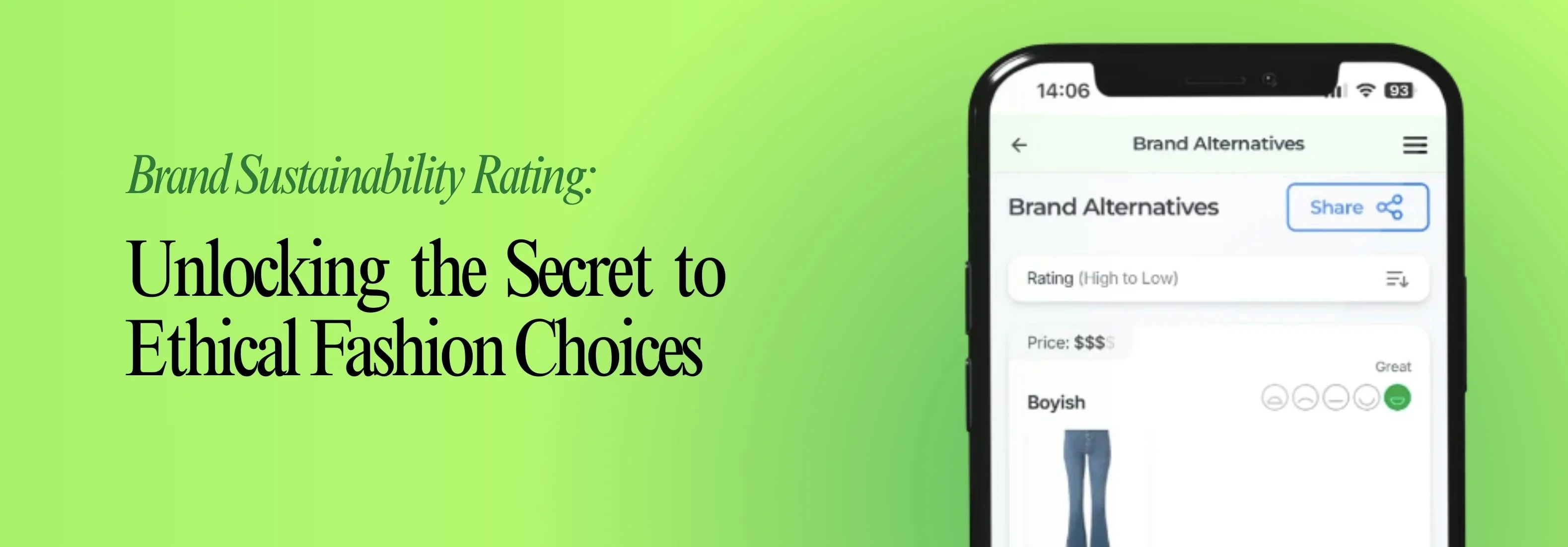
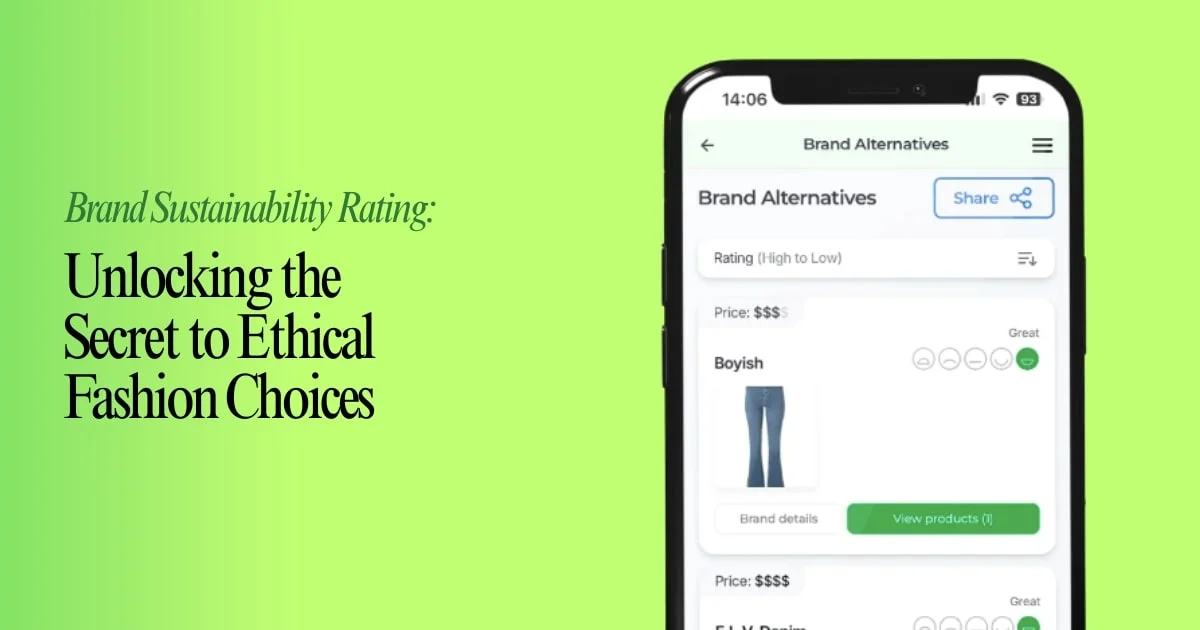
The search for truly sustainable style often feels like navigating a labyrinth of claims and certifications. In today's fashion landscape, every major brand proclaims to champion the environment, yet distinguishing genuine commitment from clever marketing remains frustratingly complex. As conscious consumers increasingly seek ethical clothing alternatives, the need for reliable, transparent information has never been greater.
This is precisely why Aloto has partnered with Good On You — the world's most authoritative brand sustainability rating system for fashion and beauty companies. This collaboration ensures that every sustainable brand recommendation you discover through our platform has undergone rigorous, independent scrutiny, transforming your shopping experience from guesswork into informed confidence.
A brand sustainability rating serves as your compass through the complex terrain of ethical fashion choices. Think of it as a comprehensive report card that evaluates how fashion companies operate across their entire supply chain — from the cotton fields where materials begin their journey to the retail environments where garments find their final homes. These ethical ratings examine three fundamental pillars that define truly responsible fashion practices.
Unlike surface-level marketing claims, these ratings dig deep into manufacturing processes, labour conditions, and social and environmental impact data to reveal the authentic story behind each brand's operations.
The fashion industry has historically operated with limited transparency, making it challenging for consumers to understand the true cost of their clothing choices.
Brand ratings change this dynamic by demanding accountability from major brands and providing shoppers with the insights needed to align their purchases with their values.
When you encounter a brand sustainability rating, you're accessing months of research condensed into actionable intelligence. This includes analysis of fashion report documents, third-party audits, certification verification, and supply chain transparency — essentially creating a comprehensive shopping guide that prioritises both style and conscience.
At Aloto, we present clear, actionable insights from Good On You's comprehensive assessments and data analysis of hundreds of Australian fashion brands and global labels across three fundamental pillars:
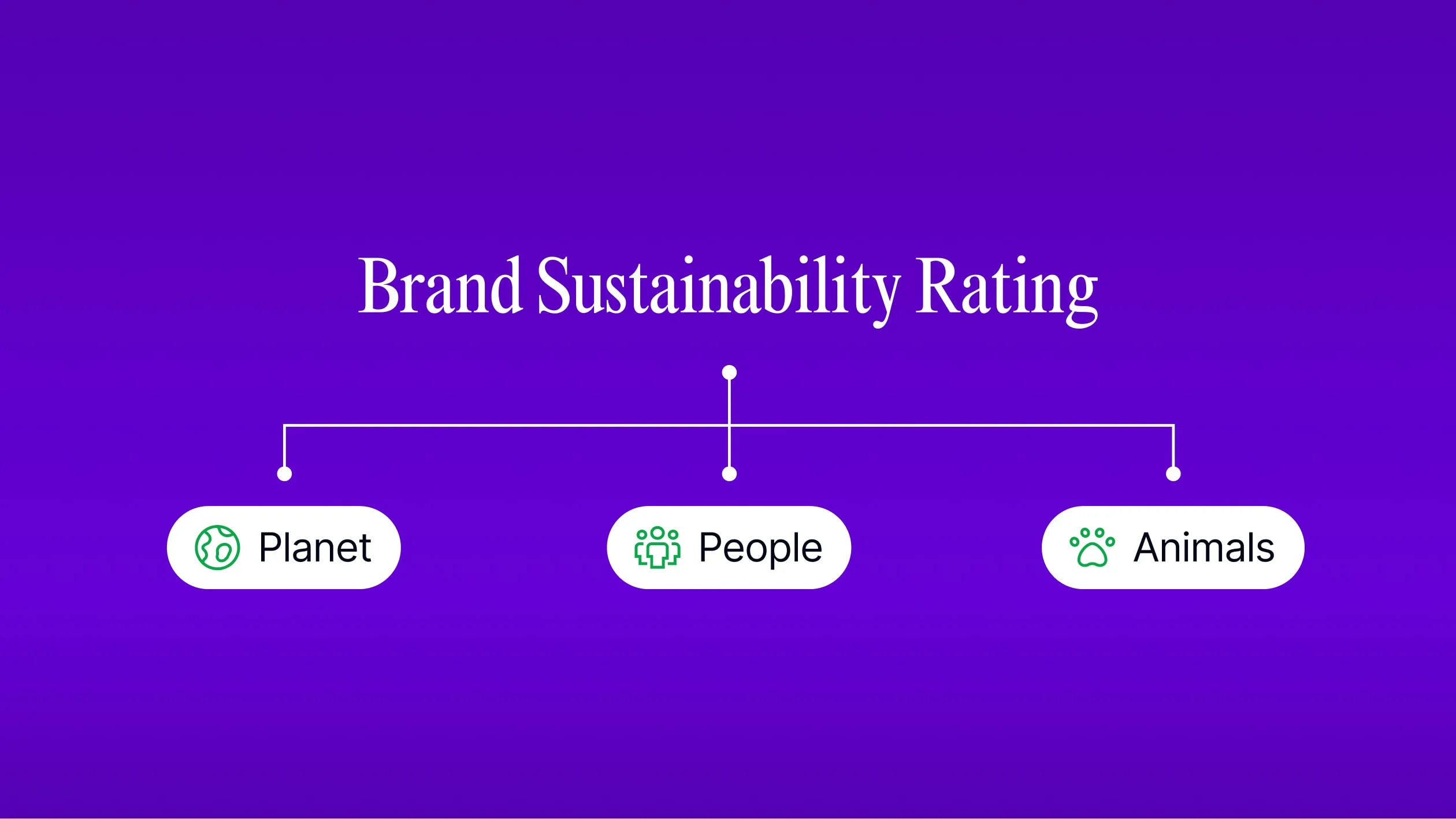
Does the brand genuinely care about those who create its products? The human rights dimension extends far beyond basic compliance, examining whether companies actively promote dignity and fairness throughout their operations.
The methodology utilised by Good On You scrutinises working conditions and safety protocols in manufacturing facilities, ensuring that the environment where garments are created meets international standards. This includes evaluating fair wage practices and living wage commitments — because true corporate social responsibility must include economic justice for the people who make our clothes possible.
Worker rights and union representation throughout the supply chain receive particular attention, as these factors indicate whether companies view their workforce as partners in creating positive change. Community impact in production regions also factors significantly, recognising that responsible fashion companies should contribute positively to local communities where they operate.
When you discover brands through Aloto, you're finding companies that treat people with respect and dignity throughout their operations, creating a ripple effect that extends far beyond individual purchases.
With climate change reshaping our world, environmental considerations matter more than ever. This pillar examines how fashion companies minimise their carbon footprint while maximising positive outcomes for the planet.
The rating system evaluates whether brands scored well on using eco friendly materials like organic cotton, recycled materials, and innovative sustainable textiles that reduce environmental harm without compromising quality. This includes assessing how companies minimise carbon emissions through efficient production and shipping practices, plus their commitment to renewable energy sources and energy efficiency measures.
Based on Good On You's rigorous research, water consumption and chemical usage in manufacturing processes receive careful scrutiny, as the fashion sector traditionally ranks among the world's most polluting industries. Companies making progress in environmental responsibility implement circular economy principles through take-back programmes and recycling initiatives that extend product lifecycles.
Every sustainable style choice you make through Aloto contributes to a healthier planet, supporting innovation in materials science and encouraging other brands to adopt more responsible practices.
For many conscious consumers taking a conscious approach to shopping, cruelty-free practices are non-negotiable. The ratings evaluate how companies approach animal testing policies and cruelty-free commitments across their entire product range.
The comprehensive assessment process examines ethical sourcing of animal-derived materials when used, ensuring that any animal products meet the highest welfare standards. The evaluation criteria include transparency around animal testing practices, as many companies maintain different policies across different markets.
Alternative material innovation to reduce animal impact represents a growing focus area, with leading brands investing in plant-based leather alternatives, recycled synthetic fibres, and other innovations that eliminate animal-derived components without sacrificing performance or aesthetics.
Navigating the alphabet soup of fashion certifications can feel overwhelming, yet understanding these standards empowers more informed choices. Several key certifications serve as reliable indicators of genuine commitment to responsible practices:
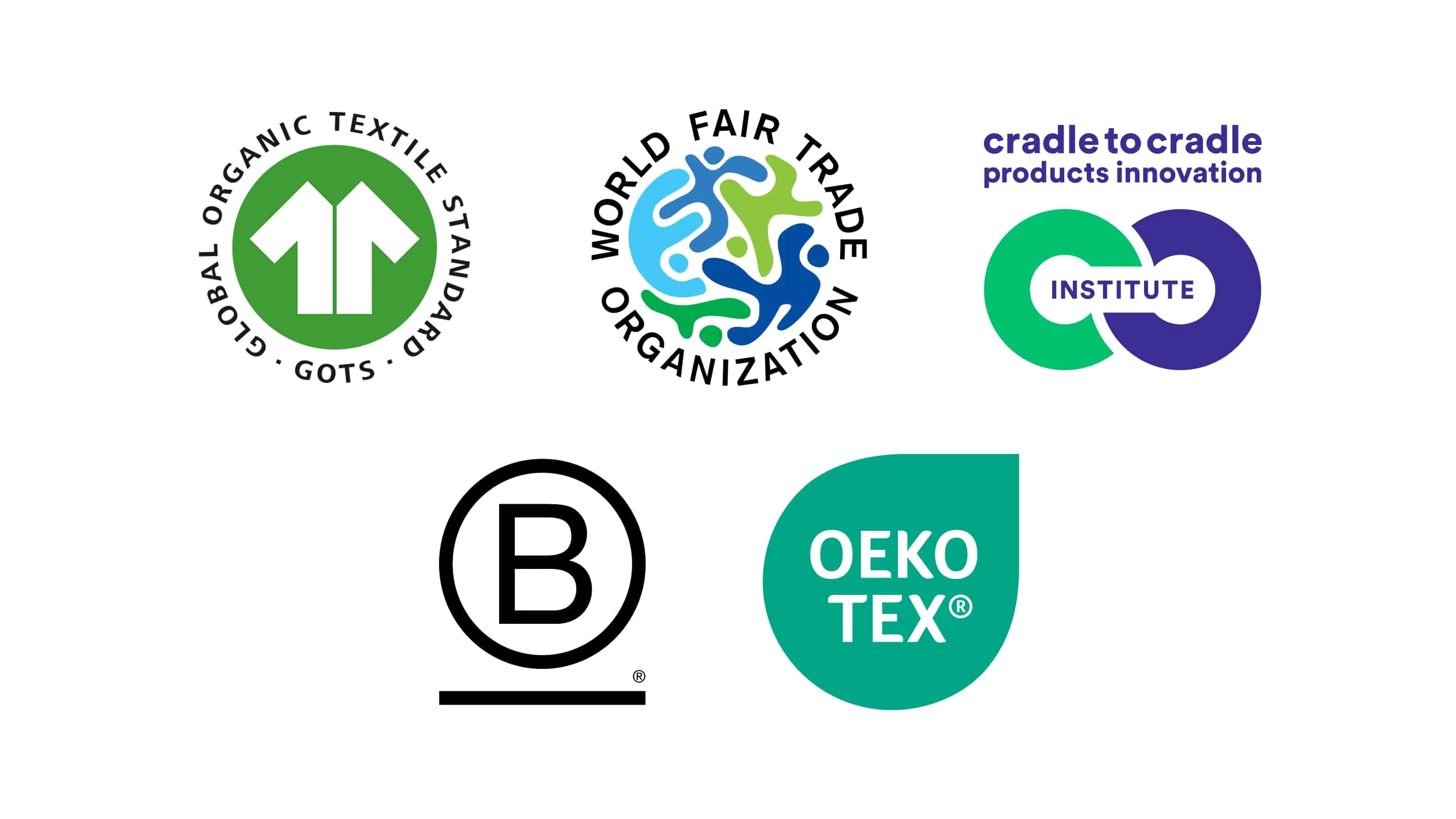
Understanding where data originates helps appreciate the rigour behind brand ratings. Multiple information sources combine to create comprehensive assessments that go far beyond marketing claims.
Companies' own reports, environmental impact statements, and ethical sourcing policies provide the foundation for evaluation. However, these self-reported documents require careful analysis, as companies may present information in ways that emphasise positive aspects while minimising challenging areas.
Fashion report documents reveal how companies measure their progress against goals, offering insights into both achievements and areas requiring improvement. The quality and transparency of these reports often indicate a company's genuine commitment to continuous improvement and corporate social responsibility.
Ethical ratings gain credibility through independent verification by organisations specialising in environmental and social standards, labour rights, and impact assessment. These assessments provide objective analysis that cuts through marketing language to examine actual practices.
Third-party evaluations often reveal discrepancies between company claims and operational reality, particularly regarding supply chain practices in regions where oversight may be limited. This independent scrutiny serves as a crucial check on corporate self-reporting.
The certification verification process examines whether companies actually meet the standards they claim to uphold. This includes verifying that certifications remain current and apply to the specific products and processes claimed.
Many companies may highlight certain certifications while applying them to only small portions of their product ranges. Comprehensive rating systems examine the scope and authenticity of claims across entire operations.
Brands' willingness to disclose supplier information, manufacturing locations, and production processes demonstrates genuine commitment to accountability. Transparency extends beyond simply publishing supplier lists to include information about working conditions, environmental practices, and continuous monitoring efforts.
Supply chain analysis becomes particularly important when examining global fashion companies that may work with hundreds of suppliers across multiple countries. Companies demonstrating high transparency typically provide detailed information about their tier one, two, and three suppliers, along with audit results and improvement programmes.
The Australian fashion landscape presents unique opportunities and challenges for sustainable fashion development. Local brands often demonstrate particular strengths in transparency and innovation, while international companies operating in Australia must navigate specific regulatory and cultural expectations.
Australian fashion brands frequently emphasise ethical manufacturing within the country, taking advantage of stronger labour protections and environmental regulations. This focus on local production often results in higher transparency scores, as brands can more easily monitor and verify their supply chain practices.
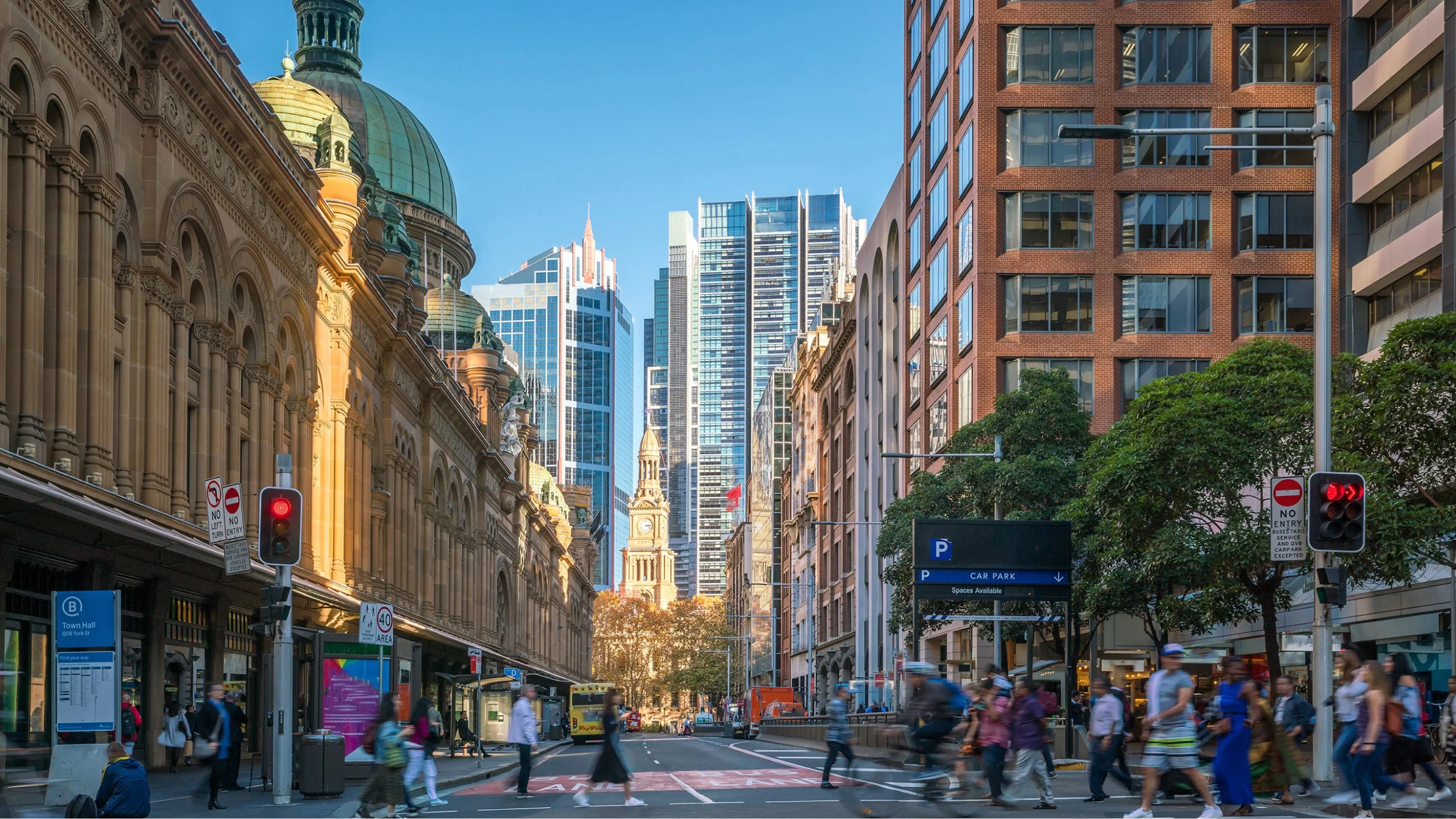
The fashion revolution movement has gained particular momentum in Australia, with consumers increasingly demanding accountability from both local and international brands. This consumer awareness has pushed many companies to improve their practices specifically for the Australian market.
Climate change impacts in Australia, including extreme weather events and water scarcity, have made environmental considerations particularly relevant for local consumers. Australian fashion companies often demonstrate leadership in water conservation and climate adaptation strategies, incorporating renewable energy sources and energy efficiency measures.
Major brands entering the Australian market frequently face scrutiny regarding their global practices, as Australian consumers increasingly research company backgrounds before making purchases. This scrutiny has encouraged many international companies to improve their overall performance rather than simply adjusting marketing for local markets.
Greenwashing represents one of the most significant challenges facing conscious consumers, as companies invest heavily in appearing sustainable without implementing meaningful changes. Recognising greenwashing tactics empowers more effective fashion choices.
Vague claims without specific data often indicate greenwashing. Phrases like "eco-friendly" or "sustainable" without supporting evidence should raise immediate questions about actual practices. Genuine efforts typically include specific metrics, timelines, and third-party verification.
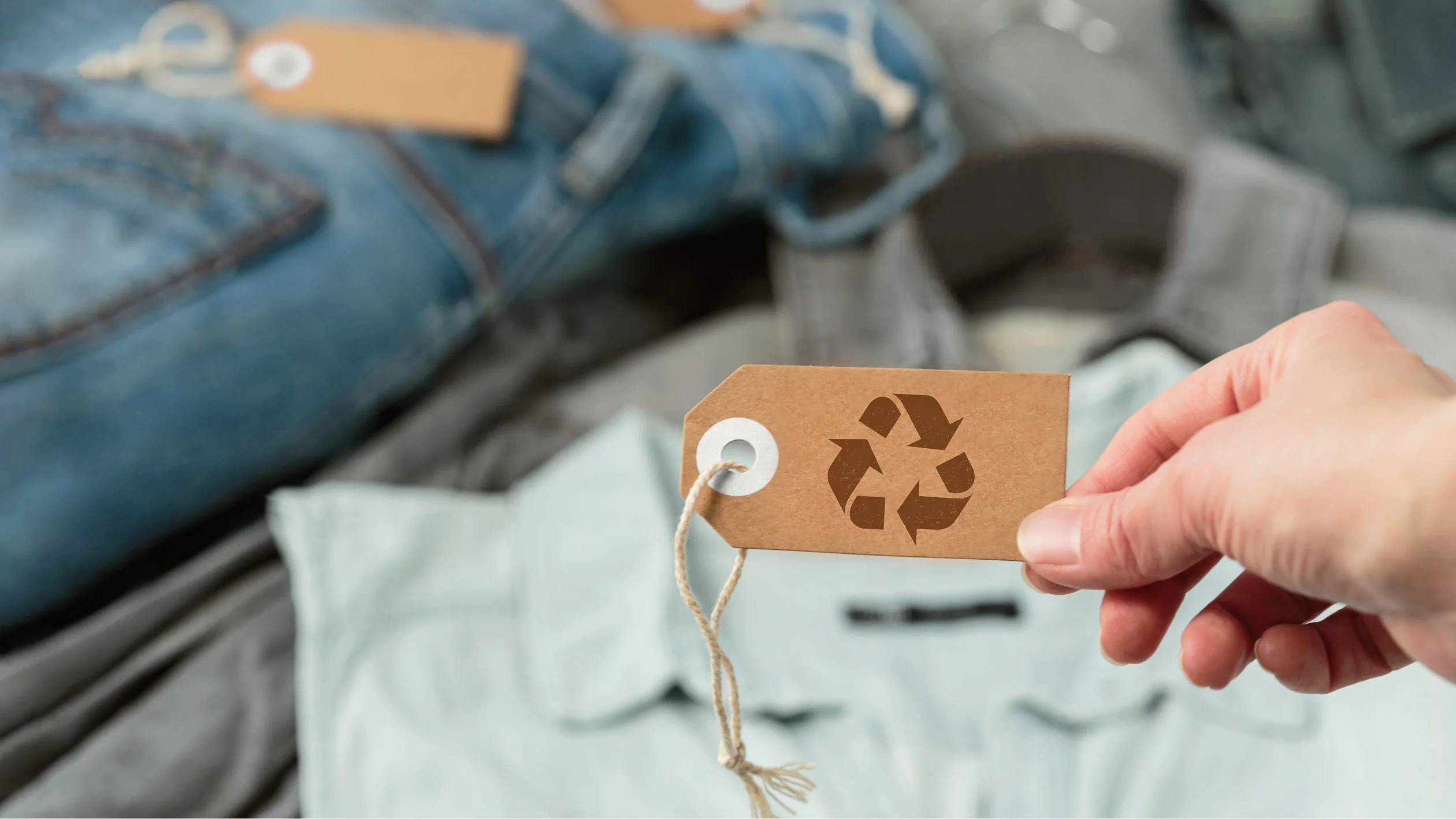
Limited scope certifications present another red flag, where companies highlight certifications that apply to small portions of their operations while implying broader coverage. Authentic leaders clearly communicate the scope and limitations of their certified practices.
Lack of supply chain transparency often indicates companies have practices they prefer to keep hidden. While complete transparency can be challenging, particularly for large global operations, companies serious about responsibility typically provide substantial information about their manufacturing practices and continuous improvement efforts.
Inconsistent messaging across different markets may indicate that claims are primarily marketing-driven rather than operational reality. Companies with genuine commitments maintain consistent standards and messaging regardless of market location.
Focus on packaging or other peripheral aspects while ignoring core manufacturing processes represents another common greenwashing tactic. While sustainable packaging matters, it cannot compensate for unsustainable core manufacturing practices.
Brand ratings serve as powerful catalysts for industry-wide transformation, creating competitive pressure that drives continuous improvement across the fashion sector. When companies see competitors achieving higher ratings, they face market pressure to enhance their own operations.
The fashion industry has historically operated with limited accountability regarding social and environmental impact. Ratings change this dynamic by making performance visible and comparable, encouraging companies to view responsible practices as a competitive advantage rather than a cost centre.
Ethical issues that once remained hidden within complex supply chains now receive public attention, forcing companies to address problems they might previously have ignored. This transparency creates accountability mechanisms that extend far beyond individual consumer choices.
The industry transformation extends beyond major brands to include suppliers, manufacturers, and other stakeholders throughout the supply chain. As brands scored higher face market advantages, they typically implement requirements that improve practices throughout their partner networks, benefiting local communities and workers globally.
Consumer education represents another significant impact, as ratings help shoppers understand the complex factors that determine performance. This education creates more informed demand that supports genuinely responsible practices while rejecting superficial solutions.
Innovation acceleration occurs as companies seek new solutions to improve their ratings performance. This includes investment in sustainable materials, manufacturing process improvements, renewable energy sources, energy efficiency measures, and supply chain monitoring technologies that benefit the entire industry.

Investment flows increasingly favour companies with strong ratings, as financial markets recognise the long-term value of responsible business practices. This financial pressure reinforces market incentives for improved performance across all aspects of corporate social responsibility.
Good On You's comprehensive rating system, integrated into Aloto, transforms your shopping experience by eliminating the guesswork that once made sustainable fashion feel overwhelming. Rather than wondering whether a brand's claims reflect genuine commitment, Aloto provides reliable assessments you can trust.
Time savings represent a significant benefit, as instead of spending hours researching each brand's practices, you can rely on curated recommendations backed by thorough analysis. This efficiency allows you to focus on finding pieces that express your personal style while supporting responsible practices.
Empowered choices result from understanding why each brand receives its specific rating, helping you make decisions that align with your personal values. Whether you prioritise environmental considerations, worker rights, or animal welfare, the rating system provides the information needed for confident choices.
Building confidence in your fashion decisions comes naturally when every recommended brand has met rigorous ethical and environmental standards. This assurance allows you to enjoy your purchases while knowing they contribute to positive change.
The platform design makes discovering new brands and alternatives an enjoyable experience rather than a time-consuming research project. Our matching system considers both your style preferences and values priorities to suggest options you might never have discovered independently.
Sustainable fashion represents an evolution rather than a sacrifice, offering opportunities to build a more intentional wardrobe that reflects both personal style and deeper values. When you use Aloto to discover ethical clothing alternatives, you participate in a broader movement toward industry transformation.
Supporting innovation in sustainable materials and manufacturing processes accelerates development of solutions that benefit everyone. Your purchases signal market demand for responsible practices, encouraging continued investment in improvements across the fashion sector.
Encouraging transparency throughout the fashion industry creates positive pressure that extends far beyond individual brand choices. As more consumers demand accountability, companies throughout the industry face incentives to improve their practices and corporate social responsibility efforts.
Contributing to better working conditions for garment workers globally represents one of the most direct impacts of choosing ethical brands. Your support helps create market demand for fair labour practices that can improve lives throughout the supply chain and benefit local communities.
Reducing environmental harm while building a conscious wardrobe demonstrates that style and responsible practices can coexist beautifully. Modern sustainable fashion offers sophisticated designs that rival any conventional alternatives while supporting planetary health.
The complexity of assessment is exactly why we've created Aloto's sophisticated platform. We utilise Good On You's comprehensive analysis of supply chains, certifications, and impact data, then present this as personalised, stylish recommendations that match your preferences.
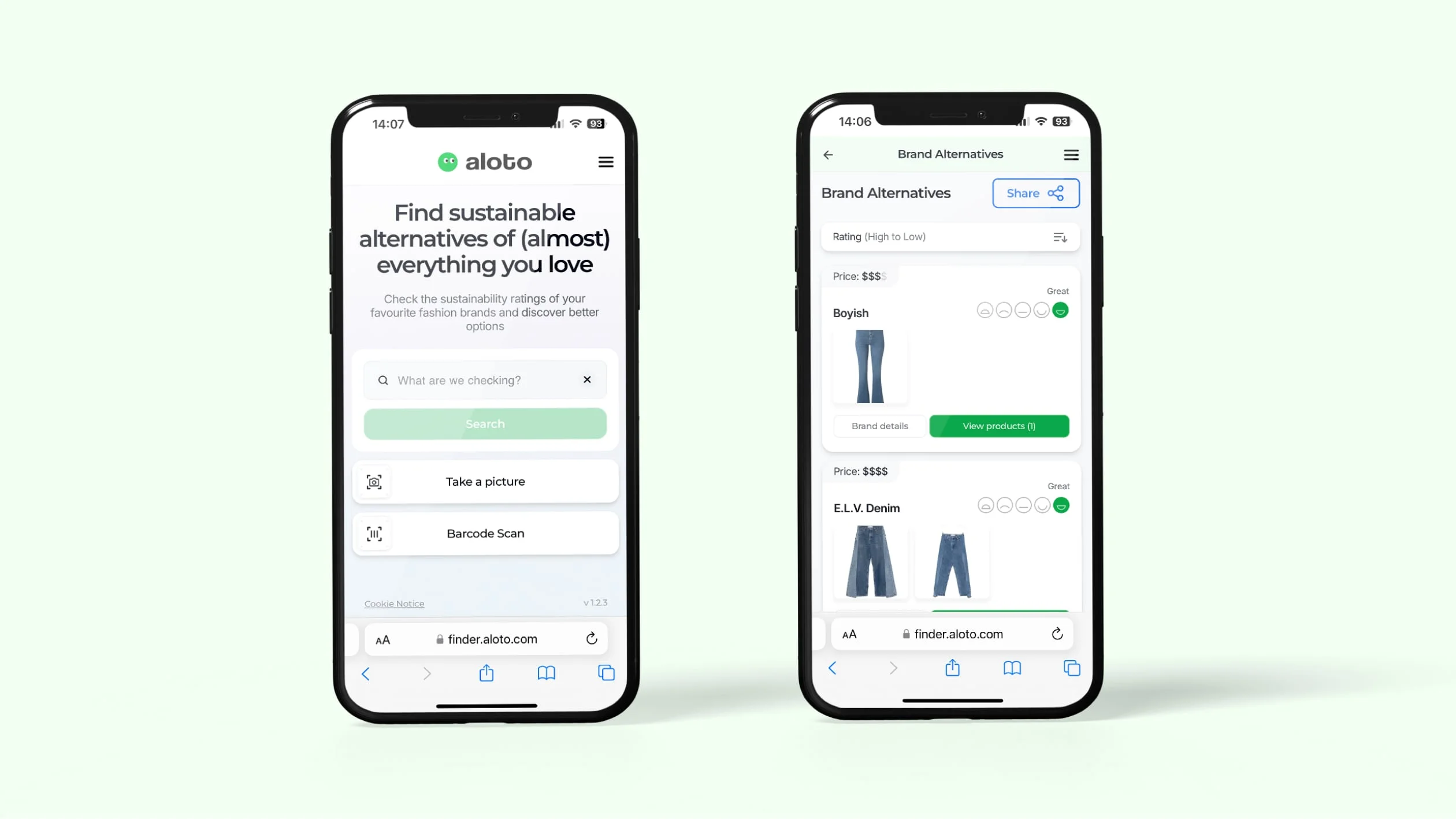
Whether you're searching for Australian fashion brands or exploring global sustainable labels, our platform ensures every option meets high ethical standards. You can focus on what matters most — finding pieces that express your personal style while supporting a more responsible fashion future.
Our comprehensive database includes both established leaders and emerging brands making significant commitments to responsible practices. This diversity ensures you'll discover options across all price points and style categories, making sustainable fashion accessible regardless of your budget or aesthetic preferences.
The platform connects you with brands that demonstrate genuine commitment to human rights, environmental responsibility, and ethical treatment of animals. This conscious approach to shopping helps you build a wardrobe that reflects your values while making progress toward a more responsible fashion industry.
Ready to put this knowledge into action? Discover your next conscious style choice with Aloto — our thoughtfully designed tool that connects you with sustainable alternatives based on Good On You's trusted brand ratings. Elevating your wardrobe just became effortlessly simple.
Check your favourite brands' sustainability ratings and discover better options at finder.aloto.com today.